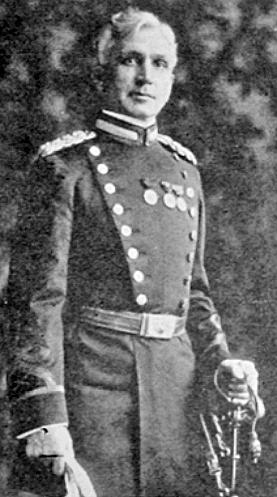

Colonel John Charles Fremont Tillson
Commanding Officer 22nd Infantry
March 4, 1916 - May 26, 1920
John C.F. Tillson entered the US
Military Academy on July 1, 1874 and graduated on June 13,1878,
20 out of a class of 43. His best subjects were Spanish and Law,
his worst subjects were Civil Engineering and Drawing.
He was commissioned an Additional 2nd Lieutenant (2nd Lieutenant
unassigned) in the 5th Infantry on June 14, 1878.
On June 21, 1878 Tillson was
assigned to Company H 5th Infantry and remained with that Company
until 1883.
From 1884-1889 he was with Company D. From 1893-1897 he was with
Company B.
He was promoted to 1st Lieutenant 5th Infantry on March 24, 1883.
He was promoted to Captain 14th
Infantry on March 18, 1897 and commanded Company I from 1897-1899
and Company F in 1901.
He was promoted to Major 14th Infantry on March 12, 1902.
He was promoted to Lieutenant Colonel 18th Infantry on December 7, 1908.
He graduated from the Army War College in 1910.
He was promoted to Colonel of Infantry on November 27, 1911.
On March 28, 1912 he was assigned to the 8th Infantry.
On July 1, 1913 he was transferred to the 15th Infantry.
On September 1, 1915 he became unassigned to any Regiment.
On March 4, 1916 he was assigned to the 22nd Infantry.
He retired on May 26, 1920.
The following is the military history of John C.F. Tillson as presented in Cullum's Biographical Registers:
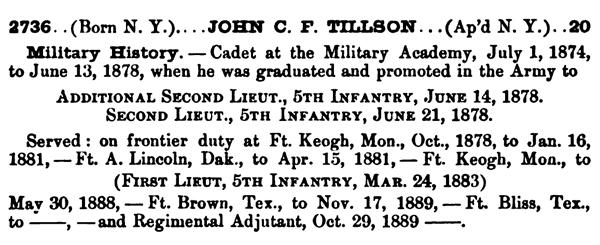
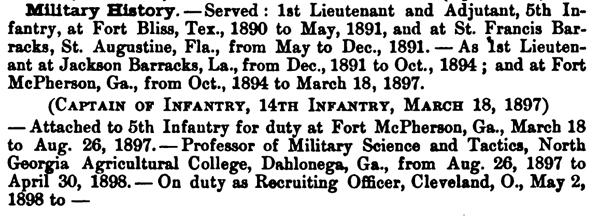
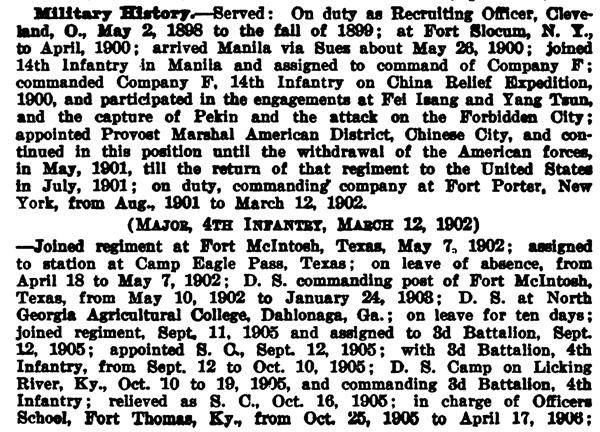
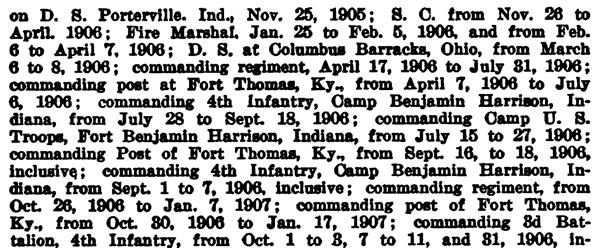
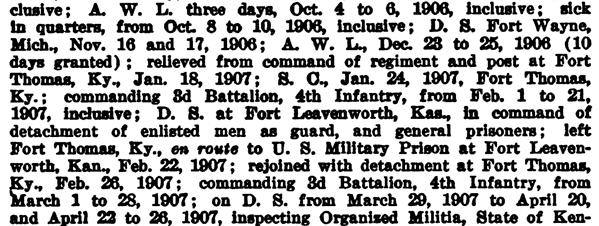
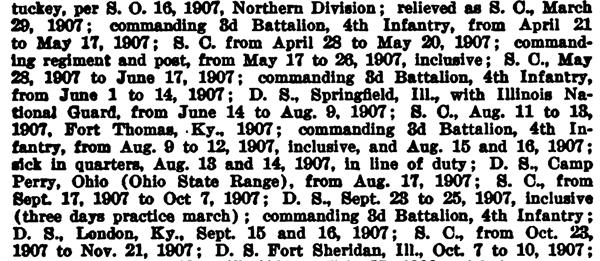
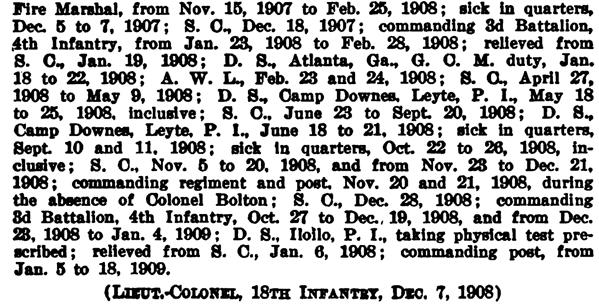

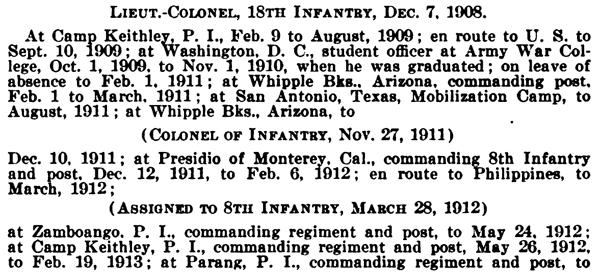
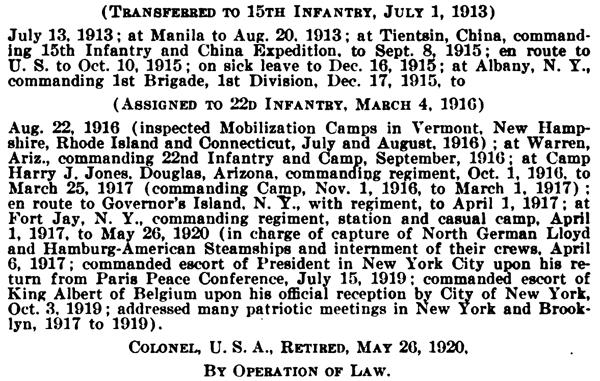
![]()

John C.F. Tillson's decorations
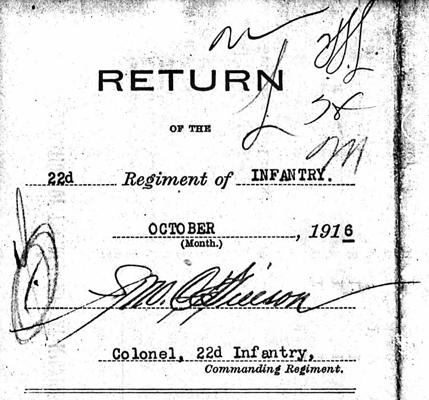
The signature of John C.F. Tillson as
Commanding Officer 22nd Infantry
on the monthly Return of the 22nd Infantry for October 1916.
|
The following article is from
the New York Times, March 10, 1918. |
Only Five Per Cent, of Slackers Real Offenders
Colonel Tillson, Who Hears
Delinquent Cases, Says That on the Whole They
Give Encouraging Impression of Underlying Loyalty to America
THE way of the
"slacker" is Yup-hank via Governors. Island. This,
however, does not by any means justify the assertion
that all of the hundreds of New Yorkers who have failed to comply
with the selective draft law and as a result have
found themselves held in more or less restraint, are "
slackers " in the humiliating sense of that word. Such is
not the case,
and some of the very best soldiers now training for the overseas
service at Camp Upton are men who were inducted
into the national army by way of the Governors Island route.
Under the selective draft
regulations, drawn up by Major Gen. Crowder, the Provost Marshal
General of the United States,
the man who is called to the colors and who fails to respond
becomes what is officially termed a " delinquent,"
and these men, in numerous instances, innocent as far as evil or
willful intent is concerned, are, by the terms of those
regulations, sent to Governors Island as fast as they are rounded
up. To date hundreds (the actual number has not been divulged)
have been taken to Governors Island by the police and military
authorities and turned over to Colonel John C. F. Tillson,
U. S. A., the commanding officer of the 22d United States
Infantry.
This little army of
"delinquents " who have passed under the personal
inspection and examination of Colonel Tillson
represent practically every race and creed in the world. Many
have been poor, ignorant fellows who could not speak or
understand a word of English. Some have been seafaring men;
others of the Bowery nomad type. Many have been negroes,
for the most part the innocently ignorant, good-natured
"darky" of the Southern cornfield type. A few have been
Orientals.
But the greatest number of them have been men who first saw the
light under the Russian flag— that is, the Russian flag that
was.
To Colonel Tillson, the typical
West Pointer, a veteran of the regulars who has fought for the
United States in the Indian wars
of the " eighties," the Cuban and Philippine campaigns,
and the Boxer troubles of 1900, has fallen the task of dealing
with
the New York delinquents, and, in the opinion of competent
observers, he has handled a difficult problem with tact
and common sense. Scores of men have been brought before him
sullen, defiant, so far as the American draft is concerned,
and a few hours later have left Governors Island for Camp Upton
as anxious to get into the service
as they previously had been to avoid it.
There have been times when
Colonel Tillson has had to use as many as three interpreters to
get at the bottom of the case
of some unfortunate who owns American citizenship papers and yet
is unable to understand a single word that is printed
on those documents. For two years Colonel Tillson served in
China, and in these years he had to communicate with
the Chinese through interpreters and so, fortunately for the
ignorant foreign-born delinquent, he has been, perhaps better
than any other officer in the service, able to understand the
position in which the non-English - speaking man finds himself
in the situation which now confronts the country. As soon as a
delinquent is located by the police, or by the Federal
authorities,
he is taken into custody, and then before his local district
board. The members of that board question him, and if they have
reason to believe that the man's failure to respond to the call
to the colors has been willful and with intent to avoid service,
they, under the regulations, immediately order the delinquent
delivered into the hands of the military authorities on Governors
Island.
Arriving on the island,
delinquents are immediately taken before Colonel Tillson or one
of his subordinate officers.
All of the difficult and obstinate cases in the end reach Colonel
Tillson, and the success which has attended his handling
of these cases is indicated by the fact that more than 95 per
cent, of the men are now faithfully and enthusiastically getting
ready
to go "over the top" at Camp Upton.
" For a long time,"
said Colonel Tillson a few days ago, " we got most of the
so-called ' slackers' from New York City,
the willful, as well as those innocent of wrong doing. They came,
for a time, in considerable numbers, and after examining them
we divided them into two classes: First, those who, after, we had
talked with them, expressed a willingness and a desire
to serve their country; and, secondly, that unfortunate type who
expressed an unwillingness to do his part in the war.
" Having classified the
men, we sent them to Camp Upton, the willing and repentant
without guard of any kind, our only
guarantee that they "would report being their own word, and
I am proud to say that in practically every instance that trust
was not misplaced. The other class, in nearly every instance made
up of non-English-speaking men, was sent to the cantonment
under guard, and there turned over to the proper authorities to
be dealt with.
" As I stated, we got
nearly all of the delinquents at first, but subsequently the
draft regulations were revised, and under these
new rules the boards send to us only those men whom they, the
boards, consider deserters, or, in the language of the
regulations,
those who have 'attempted to evade military service.'
" To my mind, the most
encouraging feature in the handling of these men is the fact that
it was the rarest exception that
we found a man among these delinquents who was born in the United
States, and in practically every instance these men
were able to give a plausible excuse. For instance, he would be a
seafaring man who had registered in good faith
but whose business between the date of registration and that of
the call had taken him to a distant part of the world,
or else the man had changed his address and had never received
the call. Members of this class invariably proved to be
the right sort, the kind that will make the very best of
soldiers.
"The next rarest class
among 'slackers ' is the man of Irish birth or parentage. They
generally showed up mad through and through,
not because they had been taken into custody, but because, as
they invariably put it, their courage had been doubted.
Every single Irishman brought before me announced he was ready to
fight to a finish, and each one of them expressed
resentment because of what they considered the Government's doubt
in his particular case. They are all at Upton now,
and I am sure that every one of them is making good.
" The vast majority of the
men brought here, however, were men who do not speak our
language. They were Italians,
Prussians, and Poles for the most part. Among them were many
"who had to be examined through more than one interpreter.
This class was perhaps our most troublesome one.
" There was also another
large class made up of men who had made claim of exemption and
who, on being arrested,
asserted that it was their understanding that their claims had
been approved. In numerous instances they were fully justified
in this assumption, for very many of them were clearly unfit,
physically, for military service, and there could be no doubt
of their rejection by the army doctors, once they reached the
mobilization camp.
" Now, in briefest detail,
I have sketched the ' slacker ' as he appeared to us on Governors
Island, and as a result of
our contact with him I want to say that, taken as a whole, our
observation of these ' slackers ' makes us feel very proud
of the way in which the people of New York rallied to the support
of the draft. My talks with these men have convinced me
that we are a united people, and, further, that the men who have
come to our country in the last few years appreciate
their liberties and are willing to fight for them.
" Our experience has made
us feel that we did not know our own people, my reference being
to these newly arrived citizens.
Liberty has been so cheap in the United States that a great many
of our people have doubted whether or not these men
appreciated it as did our forefathers who fought for and founded
those liberties. But now we are firmly convinced
that the men now in America will fight just as hard to perpetuate
those liberties as the fathers did to establish them.
" I am convinced our armies
will be as efficient and brave as any that have ever fought in
the history of the world.
I am absolutely certain that we can and we will win this war, and
that in the last desperate resort we can, if necessary,
win it single-handed.
"In all of these hundreds
of cases we have had just two of these 'conscientious objection
to war' cases.
They were brothers and American college men of the loquacious
type, and, in my opinion, clearly unbalanced mentally,
objects of sympathy rather than of contempt.
" I can only add in conclusion that, the draft has been wonderful. I am proud of our men, and I am proud of my country."
Published: March 10, 1918 Copyright © The New York Times
**********************
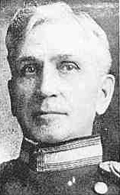
Colonel John C.F. Tillson
J.C.F. Tillson was born in
Elmira, New York, on May 26, 1856, the son of James and Elzina
Stebbins Tillson.
He graduated from the US Military Academy in 1878. Directly after
receiving his comission he was sent
to Ft Keogh, Montana, where he was stationed for the next 10
years.
It was...." 'the coldest place in the world.' It was a thrilling country in 1878--wild, uncivilized.
A horse and rider could gallop for miles and miles and see neither man nor habitation.
Huge herds of buffalo roamed the plains.
The army post was established there to keep the remnant of Sitting Bull's Sioux Indians,
who had been banished to Canada, out of the territory.
'The high-spirited young braves delighted in making raids into the tract under
our protection, and we had to chase them out.'
the colonel explained.
But he liked the Sioux Indians and grew to understand and respect the taciturn,
but brave and scrupulously honest red men.
'I never knew a Sioux who didn't pay his debts of money or kindness,'
the colonel declared.
The ELMIRA STAR-GAZETTE, 1938
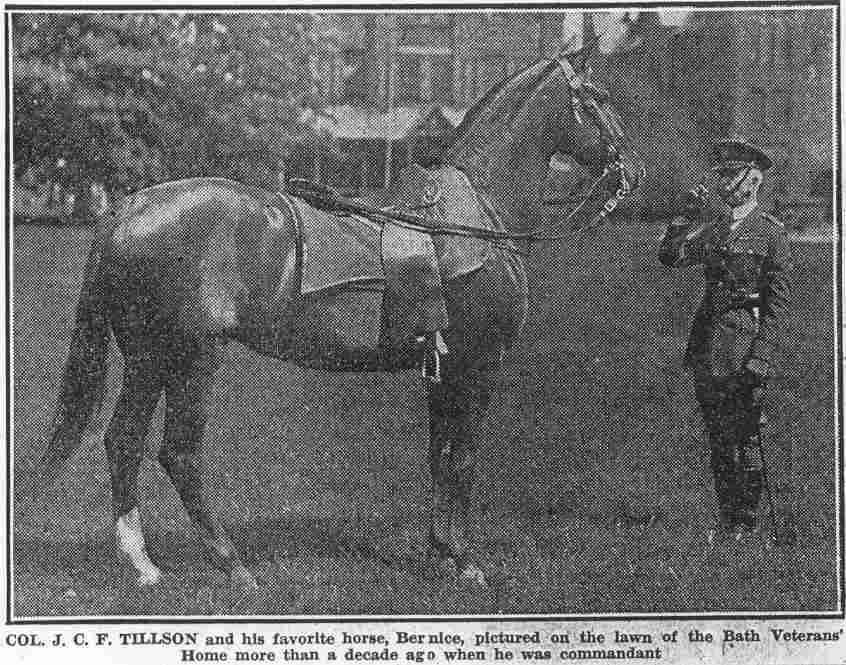
A photo of Colonel Tillson, taken during his retirement.
From The Elmira Advertsier December 16, 1941 via Grace Paris
After his assignment at Ft
Keogh, JCF Tillson served at various posts around the country. He
served in the
Spanish-American War in the Phillipines. In 1900 he and his
company held the Chien Mien gate at Peking
during the Boxer Rebellion. After the rebellion was crushed he
was named Military Provost Marshall of Peking.
During the next ten years he again served at various postings. In
1912, promoted to Colonel, he commanded
the US Expeditionary Forces in China at Tientsin. He remained in
that command until 1915 when he returned
to the continental United States. He commanded the 22nd Infantry
regiment in Arizona
until ordered to take his regiment in 1917 to New York.
He became commander of Fort Jay
at Governors' Island, New York when his regiment was stationed
there.
His mission at that time was to guard the docks of New York
harbor and the railroads leading into the port.
When war was declared against Germany on April 6, 1917 Colonel
Tillson had long been ready for it.
At one minute after war was declared he sent the 22nd Infantry to
seize all of the German ships then in the harbor.
A total of 16 ships were seized and their crews were taken into
custody. Through his realistic grasp of the situation
and advance planning Colonel Tillson and the 22nd Infantry thus
committed the first act of belligerence
by the United States against Germany in World War I.
Colonel Tillson retired in 1920
and became the Superintendent of the Bath Veterans Home for the
next ten years.
He was married to Adelaide Meek of Franfort, Ky., whom he met and
married in 1879, his second year at Fort Keogh.
They had one son, JCF Tillson, Jr. On December 16, 1941 Colonel
JCF Tillson died at the age of 85.
He is buried in Arlington National Cemetery.
John C F. Tillson
NO. 2736 CLASS OF 1878
Died December 15, 1941, at Elmira, New York, aged 85 years.
COLONEL JOHN CHARLES FREEMONT
TILLSON, U. S. A.. Ret., died at his home in Elmira, N. Y..
December 15, 1941,
at the age of eighty-five, after a prolonged illness.
Colonel Tillson was born In
Elmira, May 26, 1856, the son of James and Ruth Stebbins Tillson,
who had settled In Elmira
after leaving their ancestral home In Plymouth, Massachusetts.
Col. Tillson was a descendant of Elder Brewster, Richard Warren
and wife, John Alden and Priscilla Mullin, who were among the
original Plymouth colonists.
He graduated from the U. S.
Military Academy in June, 1878. In June, 1938, Col. Tillson
attended the 60th reunion of his class,
which was also the occasion for the graduation of his grandson,
Acting Captain John C. F. Tillson, U. S. A.
Col. Tillson was commissioned
additional 2nd Lieutenant, 5th Infantry, June 14, 1878, and 2nd
Lieutenant, June 21, 1878.
He spent the first ten years of his military life at Fort Keogh,
Montana, campaigning against the Sioux, Cheyennes, and
Apaches under General Nelson A. Miles, and was present at Little
Wolf's capture. In March, 1883, he was promoted to
1st Lieutenant. In 1881 he married Adelaide Meek of Frankfort,
Ky., the youngest daughter of Benjamin and Mary Meek
of Virginia. Mrs. Tillson survived her husband's death by only
five days.
During the next decade, Col.
Tillson was stationed at Brownsville, Ft. Bliss, and El Paso,
Texas; St. Augustine, Fla.;
Ft. McPherson, Ga.; and Jackson Barracks, La. It was while at Ft.
McPherson, near Atlanta, Ga., that he received
his Captaincy, a promotion that brought him the most pleasure of
his military life. In 1897 he was assigned as Professor
of Military Science and Tactics at North Georgia Agricultural
College at Dahlonega, Georgia, where he also taught
Spanish and French.
During the early part of the
Spanish-American War he was assigned to recruiting duty at
Cleveland, Ohio. Subsequently
he was sent with his regiment, the 14th Infantry, to the
Philippines, where he was Provost Marshal of a dangerous
district.
In 1900 his company left the
Philippines for China for active service in the Boxer Rebellion.
He participated in the
Allied attack on Peking, his company capturing and holding the
Chien Mien Gate. When the city fell, he became
Provost Marshal. During his administration he ruled over more
than 500,000 inhabitants and gained for himself an
enviable reputation as a great administrator of Justice and a
just disciplinarian. His main task consisted of restoring order,
reestablishing hospitals and schools, and feeding hundreds of
thousands of homeless people. He was so successful
in his work that when it came time for the withdrawal of American
Troops from that section of China,
the people of that worthy city petitioned him to remain as their
Chief of Police because of his virtues of benevolence,
justice, charity, and kindness.
The year 1902 proved to be a
notable year in his life. The first event was when he attained
his Majority. The second
was at the occasion of the Centennial Ceremonies of the founding
of the U. S, Military Academy, when he was cited in
the speech of the Secretary of War as being an exemplary graduate
of that institution.
In 1905 and 1906, Col. Tillson
was in charge of the Officer's School at Ft. Thomas, Ky. In 1907
and 1908 he was
once more in the Philippines, where he was stationed at Camp
Keithley, Island of Mindanao. While here, during the
Moro Insurrection, he took an active part in restoring order
among the Moros.
At the end of 1908 he returned to the United States to attend the Army War College, from which he graduated in 1910.
In 1913 he returned for the last time to China, where he was stationed in Tientsin in command of the 15th Infantry.
Upon his return from China in
1915, he was placed in command of the 1st Brigade of the 1st
Division, commanded by
Gen. Wood. When trouble threatened on the Mexican Border, he was
placed in command of a garrison of 6,000 men
at Ft. Jones, Douglas, Arizona.
In 1917 he became the Commanding
Officer of Ft. Jay, Governor's Island, and detachments of the
22nd Infantry.
On April 6th, 1917, at 3:20 A. M. Col. Tillson performed the
first overt act of the World War I by taking possession
of all the ships of German Registry in New York Harbor, among
which was the Vaterland, later rechristened
the Leviathan, and interned their crews. During the
remainder of the war, Col. Tillson was in command of
more than 15,000 men engaged in guarding all shipyards, munitions
plants, and transportation systems leading into the
principal cities of the Eastern Seaboard area, and also directed
all military trials.
He retired because of age in
1920. He was then appointed Commandant of the New York State
Soldier and Sailors Home
at Bath, N. Y., where he remained for nine years.
He is a graduate of the Army War
College at Washington, D. C., and member of the Council of the
Order of Indian Wars, the Order of the Caribao, the Veterans of
Foreign Wars, the Military Order of the Dragon,
and the recipient of numerous military decorations.
Col. Tillson's reputation as an
efficient officer, a strict disciplinarian, and a thorough
gentleman of the old school
is known wherever there is a post of the Regular Army.
He is survived by a son, Col. John C. F. Tillson, Jr., U. S. A., and several grandchildren. ¹
Below is the petition mentioned in the
above eulogy. It was presented by the Chinese people of Peking
to Captain John C.F. Tillson for presentation to his superior
officer, asking that officer to allow the
retention of Tillson as their Provost Marshall (Chief of Police).
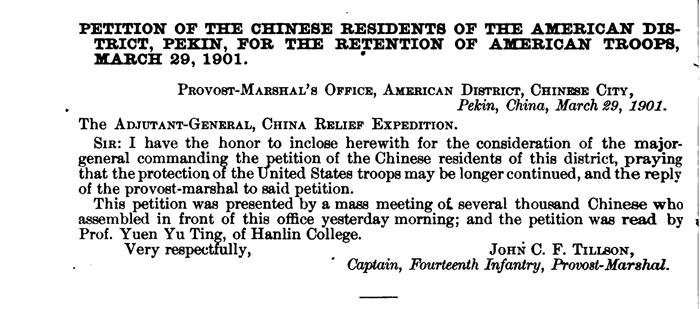
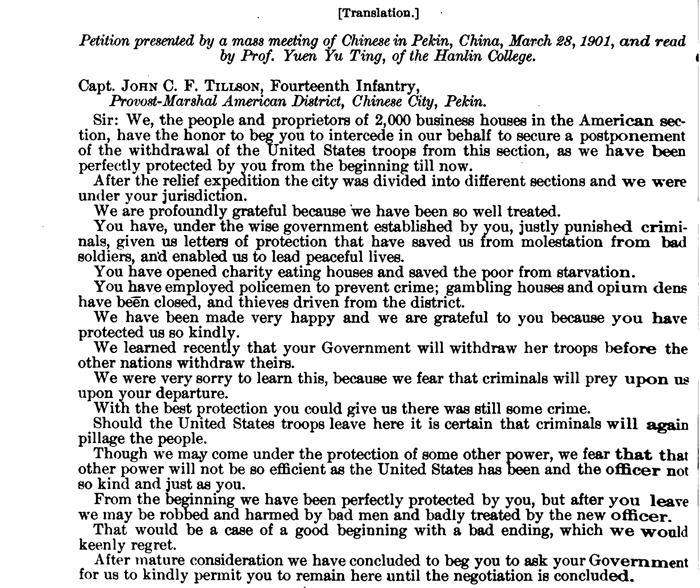

The above is from the Annual Reports to the Secretary of War 1901
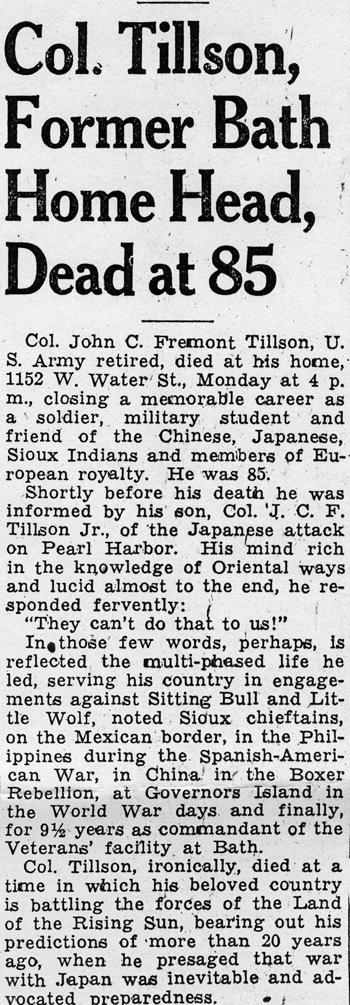
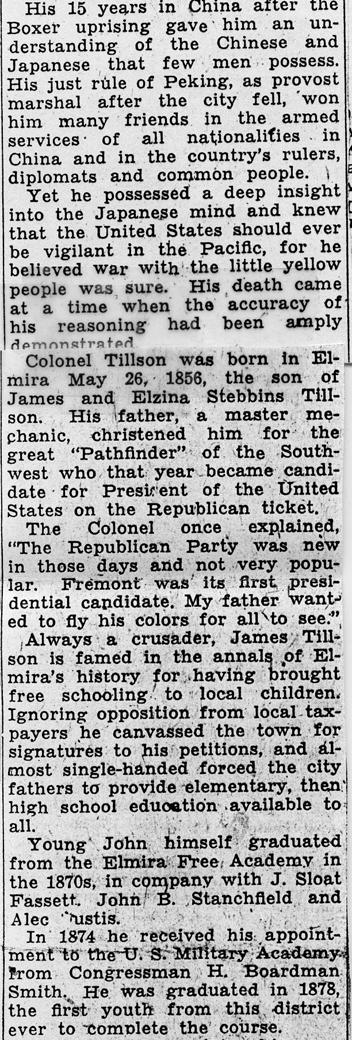
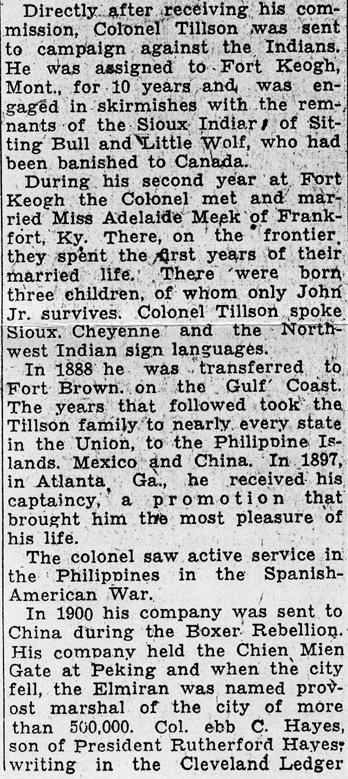
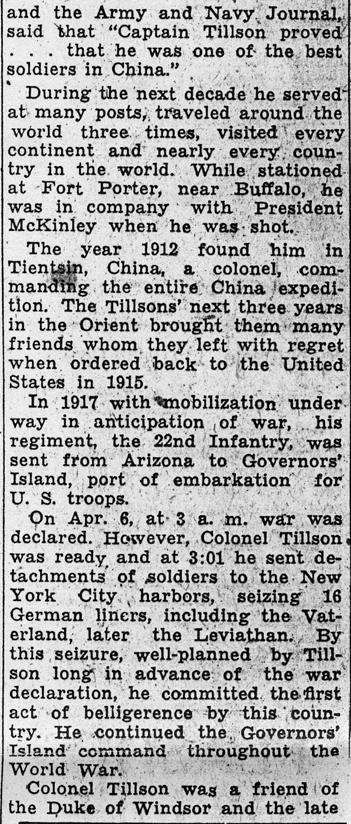
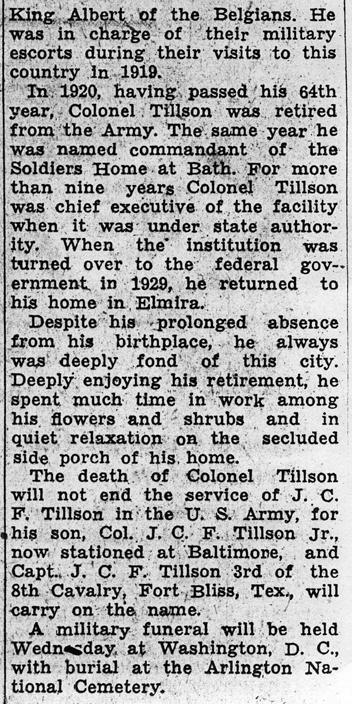
The above article is the obituary of
Colonel John C.F. Tillson in
The Elmira Advertiser,
Elmira, New York December 16, 1941
John C. F. Tillson is buried at
Arlington National Cemetery
in Section 3 Grave 2240
He was interred on December 17, 1941
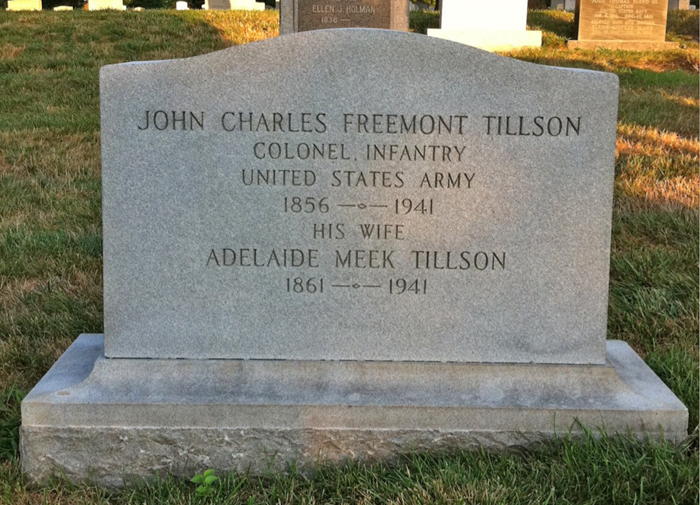
The grave of John C. F. Tillson
Photo from the Official Website of Arlington National Cemetery
**********************
The Tillson family continued on
in a great tradition of service to their country. Four
generations of Tillsons
served as officers in the United States Army.
Colonel Tillson's son, grandson
and great-grandson, all also named JCF Tillson, followed in their
ancestor's footsteps
and graduated from the US Military Academy. Colonel Tillson's son
received his commission from West Point in 1908,
his grandson received his commission from West Point in 1938 and
his great-grandson received his commission
from West Point in 1966.
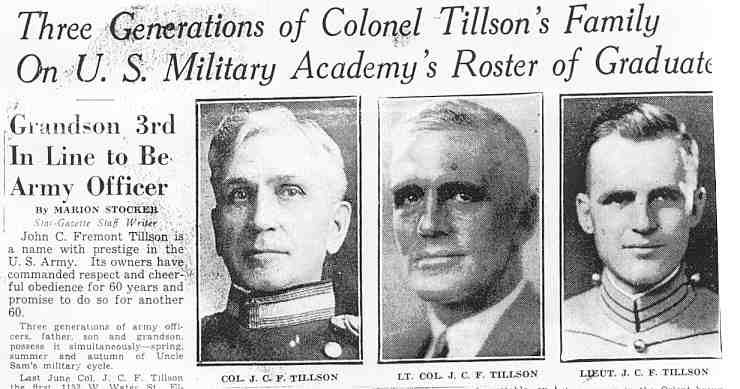
Article in the Elmira
Star-Gazette, 1938 showing the first three generations of
Tillsons
to serve in the Army.
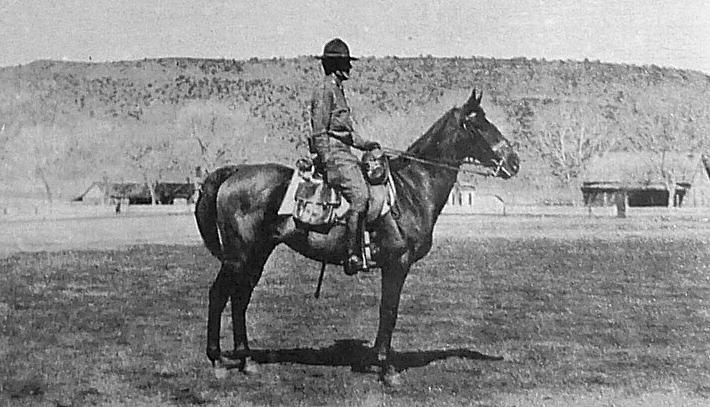
The son of Colonel John C.F. Tillson,
Captain John C. F. Tillson, 10th Cavalry, at Fort Apache, Arizona
in 1918.
He retired from the Army as a Colonel.
Photo from Huachuca Illustrated Volume 2 1996
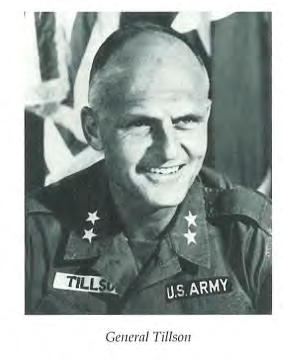
John C.F. Tillson III
The grandson of Colonel
John C.F. Tillson, John C.F. Tillson III went on to become a
Major General.
He was assistant chief of staff J-3 MACV 1966.
From March to August of 1967 he commanded the 25th Infantry
Division in Vietnam.
He was the grandson of Colonel John C.F. Tillson of the 22nd
Infantry.
His son, John C. F.
Tillson served in Vietnam as Commanding Officer Troop A 1/11
Cavalry
and was awarded two Silver Star Medals for valor. He was the
great-grandson of Colonel John C.F. Tillson.
Photo from: "Taking The Offensive October 1966 to October 1967" by George L. MacGarrigle, US Army Center of Military History 1998
**********************
¹ ASSEMBLY Vol. 1 No. 2
July 1942
by the Association of Graduates, United States Military Academy,
West Point, New York.
Printed by The Moore Printing Company, Inc., Newburgh, New York.
A heartfelt Thank You to Grace Paris for much of the above information on her distinguished family.
**********************
Home | Photos | Battles & History | Current |
Rosters & Reports | Medal of Honor | Killed
in Action |
Personnel Locator | Commanders | Station
List | Campaigns |
Honors | Insignia & Memorabilia | 4-42
Artillery | Taps |
What's New | Editorial | Links |